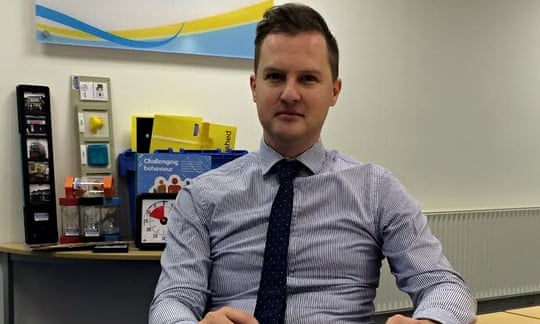James Kiamtia-Cooper supports people with learning disabilities and mental health issues who display challenging behaviour such as aggression

I wake to my alarm at six, have an espresso, shave and am out of the door, checking emails on my tablet as I go. I may be off to visit a care home, heading for the office, or travelling to carry out clinical assessments or meet with a local authority: my remit is wide-ranging. Although my routine may vary, I always have time for a cinnamon pastry and yoghurt.
If I’m on the move, I’ll be checking voicemails and occasionally having a hands-free call with one of our service managers. I’m based in London, but my work can take me anywhere from a specialist residential home in Land’s End, to a farm-based therapeutic setting in Anglesey, or to inner-city Manchester to coach staff in communication techniques.
I work for the Regard Group, a large private care-provider specialising in supporting individuals with learning disabilities, autism, mental health issues and acquired brain injury. I focus on providing clinical support for individuals who display behaviour that may challenge others, such as self-injury, inappropriate sexualised behaviour and physical aggression. I am also responsible for providing specialist training to our frontline staff.
My involvement in psychology started with a post at a New York charity supporting children and adults with learning disabilities and autism. Returning to the UK, I volunteered with a local learning disabilities charity, then worked as a local advocacy officer for Mencap, and subsequently as a police liaison officer creating awareness around hate crime and learning disabilities. These roles qualified me for a scholarship to study advocacy and then psychology, after which I worked for Mencap nationally.
Having become a listed member of the British Psychological Society, a behavioural psychology-based Master’s in analysis and intervention at Kent University’s Tizard Centre led me to a position within a community-based NHS team. Finally, I came to Regard, where my work has included setting up its positive behaviour support service according to Department of Health recommendations after the Winterbourne View report.
The aim of the service is to support staff in enabling service users to lead as full and independent a life as possible. We seek to enhance our care workers’ understanding of the sensory and social difficulties posed by diagnosis, which allows them to better interpret the behaviour of those for whom communication and understanding is difficult.
My role also includes advising Regard’s senior management team on best practice and strategic development for supporting specific diagnoses. Two of today’s tasks are rewriting the company autism policy and sending easy-to-read satisfaction questionnaires to the people we support.
Lunch always includes a banana – for slow release of energy – plus a wrap. And, of course, another coffee.
Professional conferences play their part in keeping my knowledge fresh and current, and today’s schedule includes preparatory reading for an upcoming clinicians’ network meeting in London.
I maintain involvement with my old alma mater, the Tizard Centre, delivering guest lectures to postgraduate students, and collaborating on research involving Regard and service design.
Regard is always supportive of my involvement in professional projects, which have included training NHS workers in learning disabilities awareness, sitting on the board of directors for a London learning disability charity, and participating in a CQC pilot project where people with learning disabilities inspected care homes alongside an official inspector.
This afternoon I will be meeting the parents of a young service user at their home to interview them about their son’s behaviours. Now in his early twenties, Tom has recently been placed in Regard’s care under transition from a secure NHS unit. After this meeting, which will take around two hours, I will be visiting the care home where Tom has been placed for a workshop with his immediate staff team, using the information his parents have given me along with the staff’s own observations to create an updated plan on techniques to support Tom’s behaviour.
Following the meeting I will be working alongside Tom’s team, observing how they support him and coaching them in communication techniques as Tom is non-verbal although able to communicate by using picture prompts.
I clock off at a reasonable time because work-life balance is important to me. Down-time outside work is an engrossing movie, and a jog or game of squash, plus quality time with my family. There are ground rules, though – my wife has told me never to analyse her behaviour …
I generally sleep soundly at night as I have planned what I need to do the next day. As I drift off, I often find myself reflecting on a look, expression, mannerism or positive behaviour seen for the first time, and think: “Job done!”
Source: http://www.theguardian.com/social-care-network/2015/mar/06/day-in-the-life-behaviour-specialist


